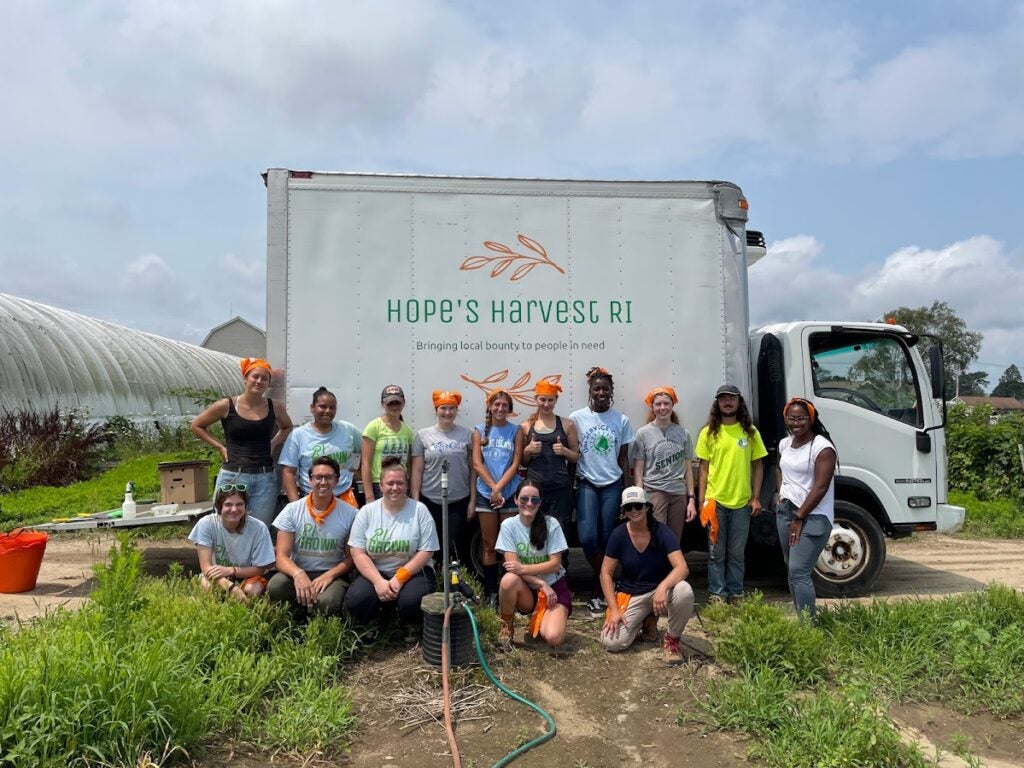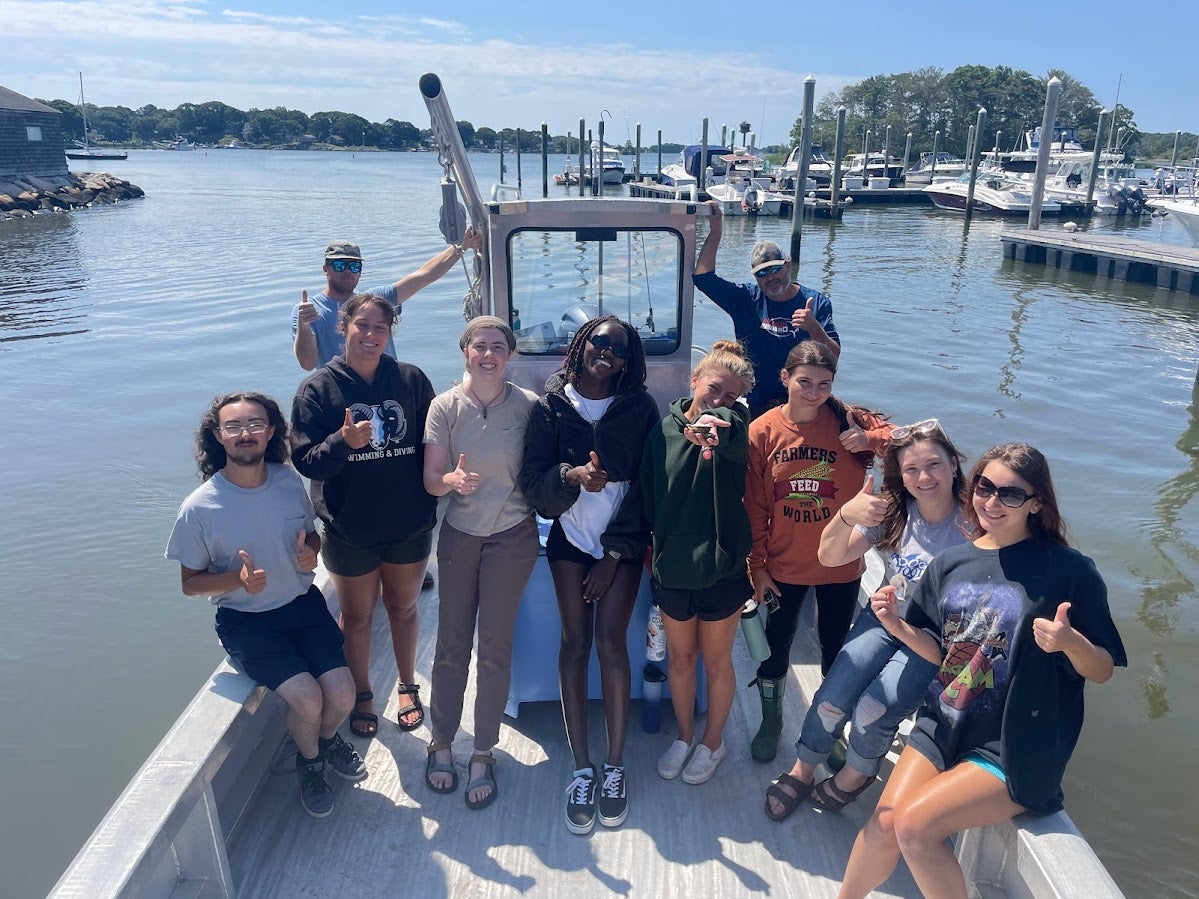KINGSTON, R.I. – Oct. 19, 2023 – What does our state’s food future look like? Is it a bucolic field of billowing corn, a three-story hydroponic greenhouse, a shellfish hatchery, or all of the above? How will that landscape reflect and feed all of the residents of this corner of New England?
More importantly, if you’re a student who loves food (growing or eating it), how do you fit into the modern and future food systems?
Several URI students now have a better understanding of “farm to table” with a new program for both University of Rhode Island and Community College of Rhode Island students that’s helping them develop and bring that understanding to their studies and beyond.
The new fellowship builds on URI’s history as an “agricultural school” with new pathways in the field of food for students from diverse majors.

Sara Churgin of the Eastern Rhode Island Conservation District, a mentor in the program, says the program gives students the chance to work in a professional environment to better understand what is expected of them when they enter the workforce—with the added bonus of getting to work outdoors in beautiful environments.
“It’s such a great learning experience for students because it’s hands-on at a job they might want to do when they graduate,” she says, “and they’ll also be more employable when that time comes.”
Agriculture in action
The paid experience is tailored for students interested in food system-related careers. Selected students work on real-projects alongside industry mentors, receive in-depth professional development, networking opportunities, and get to try their hand at new skills, like grant writing.
Mary-Kate Kane of Aquidneck Community Table says, “I wish there was a program like this when I was an undergrad! It’s the perfect way for students to explore career paths, meet people in a variety of fields and ask questions about their work and what led them to their current position. In a small state like Rhode Island, a program like this is essential.”
The program is open to undergraduates due to graduate in December 2024 or later and applicants can come from any major.
Students in the program are placed with food industry mentors based on their skills and interests. Mentor organizations slated for the 2024 program year include Earth Care Farm, Rhody Wild Gardens, Ocean Hour Farm, the Rhode Island Department of Environmental Management Division of Agriculture, Rhode Island Commerce Corporation, Plantopia, Our Kids Farm, the Eastern Rhode Island Conservation District, and researchers and specialists from URI.
Food systems pipeline
The Rhode Island Agriculture and Food Systems Fellows Program started last year as a way to train students passionate about careers centered on food—as producers, processors, policymakers, educators, advocates or communicators.
The program aims to serve as a talent pipeline for entry- to mid-level professionals with a comprehensive understanding of food-related science and social science—how humans interact with food, where inequities with food access and security exist, and how they can contribute as professionals to build a safer, healthier, more sustainable and just food system for all.
“We want to train students to help address the intense needs in our community and learn how to be a part of sustainable structures,” says Kate Venturini Hardesty of Cooperative Extension.
The new Food Fellows program, launched this year, models itself on URI’s popular and well-known Energy Fellows program.
“My roommate was an Energy Fellow. Noticing how she was able to continue obtaining internships after the fellowship intrigued me,” says senior Ella Zalewsky, a sustainable agriculture and food systems major from South Kingstown. The fellowship’s connections and networking have already proved invaluable, landing Zalewsky a second internship with the Rhode Island Food Policy Council.
The first Food Fellows
Zalewsky and several other students from URI are entering their final months as the inaugural class of RI Agriculture and Food System Fellows. They have enjoyed excursions and learning opportunities this year at URI’s Gardner Crops Research Station and Peckham Farm, a discussion of Rhode Island’s food strategy with Commerce Rhode Island, and visits to Farm Fresh Rhode Island and the Rhode Island Community Food Bank. They collected vegetables with Hope’s Harvest, learned about Indigenous foodways with Dinalyn Spears of the Narragansett Indian Tribe, toured Moonstone Oyster Farm, discussed aginnovation, and met with the Rhode Island Food Policy Council, Harvest Kitchen and local farms.
Junior Grace Chasanoff, an animal science major from Connecticut, was well acquainted with the world of agriculture, growing up on a farm, but says that the fellowship expanded her knowledge of sustainability and helped her forge connections in the field: “Meeting all of these amazing people wouldn’t have been possible in any other setting,” she says. “Sustainability is the way of the future for my generation. The internship has guided me toward what I want to do in the future, hopefully one day owning my own sustainably-run farm.”
Students in this new fellowship learn there’s more to the food industry than what they see on the table—it’s growing food but also processing, marketing and policy. It’s not just about growing corn, it’s about harvesting oysters, cultivating kelp. They learn how to talk to people, think critically and understand the business side of the industry. It’s ideal for students with passion for a career for the common good, or a career in food that can do good work in the world.
Senior Amy Voigt from New Jersey (biological sciences and psychology) says the program has also given her confidence, knowledge and resources to share information about food and sustainability beyond URI: “The academic coursework prepared us with the skills to share knowledge with the public in a way that encourages a deeper understanding of complex issues. I am very grateful for this program, as it has prepared my fellow interns and me with opportunities to have not only a career, but a voice in the work we are doing.”
Cooperative Extension is accepting applications from students at URI (and CCRI) through Oct. 27 to join the next cohort starting Jan. 24. Students from any major can apply. Learn more at uri.edu/coopext/afsfp.
The new Food Fellows program models itself on URI’s popular and well-known Energy Fellows program, established in 2008 to engage and train students passionate about a career in sustainable energy. Over 150 students have completed the program to date with program graduates going on to work full-time in clean energy as managers, policymakers, business owners, data analysts, developers and educators. URI Cooperative Extension operates both programs. Learn more here.

